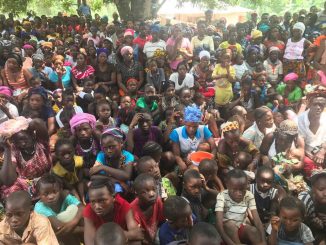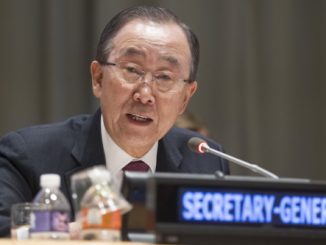
Africell, Telecom Operators owe Sierra Leone Le88.1 billion in debts
By Chernoh Alpha M. Bah, Matthew Anderson, and Mark Feldman
An internal audit into revenue arrears of Sierra Leone’s National Telecommunications Company (NATCOM), the country’s telecoms regulatory agency, has revealed a chronic failure by telecommunications companies and other operators to pay yearly license fees and other operational service charges amounting to billions of Leones owed to the government of Sierra Leone.

Details of the report, which the Africanist Press has seen, states that in 2019 alone a total of 21 operators, including two leading mobile companies – Africell and QCell – have outstanding balances totalling Le88,166,972,954.82 with no approved payment plans, in violation of the country’s finance laws.
Section 12(e) of the Finance Act mandates the National Revenue Authority (NRA) collect all non-tax revenue debts owed to the government of Sierra Leone. Authorities say they discovered “21 operators with outstanding balances in the debtor’s register totalling Le88,166,972,954.82 who were purported by NATCOM to be on a payment plan in contravention to Section 12(e) of the Finance Amendment Act” for fiscal year 2019. They noted that approved payment plans were not submitted to authorities for verification to determine whether concrete arrangements were in place for the collection of the outstanding billions of Leones owed to the government of Sierra Leone by the telecommunications companies and other operators.
The list of debtors includes Africell with an outstanding debt of Le17,273,127,608.21 with no approved payment plan in fiscal year 2019; and QCell with a balance of Le70,327,569,306.75 and an accompanied payment plan signed in 2018. Other debtors, like Medosat TV with an outstanding debt of Le227,657,650.00 and Diakem with a balance of Le134,053,600.00 also lack approved agreements for payment plans. The remaining debts are owed by 17 other private radio stations and media companies.
Authorities also say NATCOM’s revenue arrears reported in the General Purpose Financial Statements for 2019 was Le10,067,603,040.90; but NATCOM’s record of debtors show total revenue arrears of Le180,014,691,660.19, resulting in an understatement in the financial statements of Le169,947,088,620.
“Revenue and revenue arrears figures in the financial statements in respect of NATCOM may be misstated,” they noted, adding that a reconciliation carried out between the NRA records and NATCOM also show a variance of Le86.82 billion above that recorded in the NRA cashbook.
“We were unable to ascertain the correctness and accuracy of the revenue deposited into the account because of lack of documentation. There is a potential loss of needed revenue to the government,” they stated.
However, NATCOM’s director of corporate affairs, Abdul Ben-Foday says NATCOM is not responsible for a misstatement in the financial statement. “NATCOM on its own, do not operate a separate account anywhere else where payments for services of any sort are lodged,” he says, adding that with a single treasury account in place, operators, internet and other service providers are required to make payments for invoices issued by NATCOM directly at the Bank of Sierra Leone’s Single Treasury Account.
“Once this is done, the payee is expected to take the credit advice to NRA for onward issuance of receipts. In the event there is a difference in the amount in the general purpose financial statement for NATCOM at BSL and NRA records, this could be attributed to those payees who wouldn’t take their respective payment advice to NRA for the issuance of their receipts,” he explained.
Ben-Foday also said NATCOM has three operators with whom they have agreed payment plans, and the NRA is aware of said plans.
“As a matter of fact, we have three operators with whom we have agreed payment plans with NRA in the know,” he says, adding that, “the payment plan in contention was agreed among NATCOM, the operators, and NRA. As it is, two of the operators (Orange and QCell) have completed payments as agreed, while Africell is in full compliance with the agreed terms.”
Authorities said they also discovered that two receipts with numbers 447791 and 469245 were issued by an NRA officer on 28th February, 2019 and 7th May, 2019 respectively to a single operator, for a payment of Le60,162,410 made by Transnational TV on 8th February, 2019. Authorities are demanding that both the NRA and NATCOM should provide explanation, with documentary evidence, of why they issued two receipts to a single operator and why NATCOM maintained a payment plan instead of transferring the debtors to the NRA as required by the Finance Act.
“NATCOM should also submit all approved payment plans to the relevant authorities within 15 days upon receipt of this report,” they stated.
Africanist Press could not independently verify whether the stipulated recommendations have been responded to at the time of this publication.
Africell, Africa’s Telecom Giant, Under Scrutiny
Perhaps most at issue in the report is the status of Africell’s debt. Documentary evidence and details of the internal government audit for 2019 shows that Africell still has an outstanding debt of over Le17 billion in 2019 and a further Le12 billion in 2020.
Founded in 2001 by Ziad Dalloul, Africell is a multinational telecoms company headquartered in London, UK with operations in Uganda, Democratic Republic of Congo, The Gambia, and Sierra Leone. The company has about 14 million active subscribers across Africa. Africell Sierra Leone, launched in 2005, now covers more than 76% of Sierra Leone’s population. Since 2009, the company is rated as the top in the country’s telecom sector with more than 4 million active subscribers and a growing footprint of 3G and 4G services. Africell’s growth in Sierra Leone is driven mostly by data revenues, 20% of which comes from customer recharges for data products. Customers complain that rates and data service costs have been trending upwards in recent years.
Africell, with an established annual revenue base of US$260 million, was awarded a US$100 million financing agreement in November 2018 from the Overseas Private Investment Corporation (OPIC), a US government agency that finances and supports investment by
American business in emerging markets.
In August 2019, the US embassy in Sierra Leone convened a special meeting in Freetown to underline the significance of the OPIC support to Africell. Officials at the gathering noted that the OPIC financing will be used to expand availability and quality of telecommunications across Africell’s operations in Africa.
“The solid partnership between the US embassy and the private sector, exemplified by this agreement with Africell, will lead to stronger relationships and fruitful development,” the US Ambassador to Sierra Leone, Maria Brewer said at the event.
“We are the leading telecommunications and data operator in Sierra Leone and we intend to sustain and enrich this leadership position with the support of the OPIC funding,” Ziad Dalloul said.
NATCOM would eventually laud Africell for, what it calls, the company’s exceptional commitment to its staff in 2019, the same year that Africell held an outstanding debt of over Le17.2 billion in revenue owed to the government of Sierra Leone.
But the size and power of Africell, and its US connections, raise further concerns about the company’s avoidance of regulatory fees and the payment of much needed funds to the cash-strapped Sierra Leone government. As a US-backed company which makes hundreds of millions of dollars from African citizens, Africell is coming under increased scrutiny for failing to meet its decidedly minor financial obligations to the countries in which it operates.
In Sierra Leone, however, the company’s failure to meet its obligations to the public and the government has been obscured by charitable gestures, such as the recent building of a digital clocktower in Kenema named after the current president, Julius Maada Bio. At the launch of the clock tower, First Lady Fatima Bio praised Africell as “a company that has Sierra Leone at heart.”
At the very ceremony, Africell Managing Director Shadi Gerjawi attested to Africell’s commitment to “supporting all Sierra Leone through jobs creation” and “corporate social responsibility,” gestures which have been undermined by recent revelations of tax and licensing fee avoidance in an environment that already heavily favors multinational corporations and demands relatively miniscule payments in fees and taxes.
NATCOM’s director general, Daniel Kaitibi says the current payment plan with Africell was signed by his predecessor, Maxwell Massaquoi, and requires Africell to make payments on a weekly basis.
“Africell pays every week Le1.5billion to the Consolidated Fund. This goes towards paying off their debts,” he said, adding, “this was an agreement with the former DG before me. There is an agreed payment plan signed by both parties, and we have the authority to get into a payment agreement with our players.”
Kaitibi says NATCOM only informs the NRA about such payment plans due to an MOU that allows NRA to collect revenues on their behalf.
He also claims that Africell’s outstanding debt for fiscal year 2019 has been fully repaid. “They don’t owe anything for 2019 but for 2020, and for which they are making weekly payment,” he said, adding that the same payment plan signed with Africell in 2019 was continued in 2020.
Kaitibi equally denies that there is no payment plan in respect of Diakem’s outstanding payments. “I personally dealt with the owner of Diakem. His company has not been in operations for sometime now and we were about to take his frequency from him. The Act says when you don’t pay for spectrum for two years, we have the right to take the frequency from you. He came and asked that we give him a payment plan as things were not very good for him,” he said.
On QCell’s outstanding payment, Kaitibi also says the payment plan was signed during the Ernest Koroma regime when Momoh Konte was head of NATCOM. “So the Le70 billion is for the 4G license they have and for which they are yet to implement. As a new entrant, these are some of the things given them to start operations,” he said, adding that QCell has paid Le5bilion already and are expected to pay an additional Le2billion in December 2020.
“They will then pay Le10 billion every year until they are cleared. That is the payment plan that was signed by Momoh Konte,” he stated.
The internal government audit did state the existence of an approved payment plan for QCell’s outstanding debt dating to 2018, but makes no mention of an existing arrangement for the fiscal year 2019. In the case of Africell, authorities say they were not shown any approved payment plan for the outstanding debt of over Le17 billion owed by the company in 2019 alone. NATCOM officials, however, insist that the 2019 debt has been repaid but they provided no evidence in support of their claims to Africanist Press.
“Showing you payment plans is above my remit,” Ben-Alpha NATCOM’s corporate affairs director told the Africanist Press. Kaitibi, on the other hand, says they have been advised against showing copies of the payment plans to Africanist Press because it violates confidentially clauses in the agreement.
Africell would also not comment on the issue when contacted by Africanist Press. “Unfortunately, we will not be responding to this,” Africell’s Media Relations Manager, John Konteh said.
A list of the 2019 debtors as extracted from an advance copy of a government audit can be found on the Africanist Press website:



